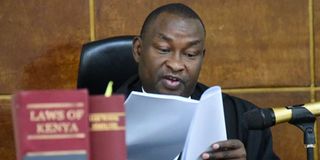Premium
You were his home nurse, not wife, court tells woman

Justice Kanyi Kimondo.
What you need to know:
- At the time of his death, Mr Karwigi was 78 years old and sickly.
- Ms Wangari told the court that he visited her parent’s home in Elburgon, Nakuru for payment of Sh30,000 in dowry.
- Justice Kimondo she did not provide cogent evidence to show that the relationship mutated into a marriage.
The High Court has annulled an alleged Gikuyu customary marriage contracted by a Murang’a businessman and his home-based healthcare giver.
Ms Loyce Wangari Ngigi wanted stake in the estate of Mr Stephen Ngigi Karwigi, who died in August 2013 leaving behind a construction firm and over 40 landed properties (property that generates income for the owner).
At the time of his death, Mr Karwigi was 78 years old and sickly.
Ms Wangari told the court she married Mr Karwigi in 2009 under the Gikuyu customary law and that he visited her parent’s home in Elburgon, Nakuru for payment of Sh30,000 in dowry.
During the 2012 visit, she said, Mr Karwigi bought and gifted her parents with two pieces of land in Nakuru.
No proper celebration
But Justice Kanyi Kimondo dismissed her claim on grounds that there was no meaningful or proper celebration of a Gikuyu customary marriage.
"There was no cohabitation with habit and repute. The relationship between the protestor and the deceased did not reach the threshold of a marriage either by custom or presumption," the court ruled.
Justice Kimondo added that although there was no contest that Ms Wangari lived with Mr Karwigi from 2009 until he passed on, she did not provide cogent evidence to show that the relationship mutated into a marriage.
"No reliable evidence was marshalled to show that the relationship metamorphosed into a marriage. They had no children together or any joint assets," Justice Kimondo said.
Also, no evidence was adduced indicating that the man’s family, friends and community treated her as his wife.
Ms Wangari wanted his estate distributed equally between her and the house of Mr Karwigi’s first wife who died in March 2003.
Cohabited
Ms Wangari argued that she cohabited with Mr Karwigi as husband and wife from 2009 to 2013.
However, the court ruled she had first entered the household to give care to Mr Karwigi because he was diabetic and amputee.
Justice Kimondo said, according to the evidence before court, Mr Karwigi only visited Ms Wangari’s homestead once and the ruracio (dowry) process was never completed.
"It is possible that the deceased may have asked for the protestor’s hand in marriage in his twilight years. But I find that all the requisite stages of a Gikuyu customary marriage, including ruracio and ngurario, were not carried out in this case," said justice Kimondo.
Further, the court stated that Ms Wangari’s witnesses in court were her blood relatives — her mother and uncle. She failed to provide an independent witness to prove the celebration of a customary marriage.
The witnesses insisted Ms Wangari was Mr Karwigi’s wife and that "the care to the deceased when he was unwell was incidental".
She said she lived with the manin his house in Mukuyu, Murang’a County.
Returned to mother’s home
After he died, she relocated to his land in Kiawanjugu and later returned to her mother’s home.
But her evidence and that of her mother were contradictory.
For Ms Wangari, the two plots in Elburgon were part of the dowry while her mother said they were mere gifts.
"The trouble is that the sale agreements were executed on January 21, 2011 and August 17, 2011 respectively, well before the dowry ceremony," said Justice Kimondo.
The court also held that it was inconceivable that dowry could be paid to the bride.
"This is material since the properties were jointly owned by the mother and the daughter who was the one being betrothed," said the judge.
In her evidence, Ms Wangari relied on the pictures of Mr Karwigi’s funeral service, the funeral programme and the village chief’s letter which listed her as one of his "survivors".
But the man’s daughter, Faith Wangui Ngigi, told court that the funeral programme was prepared by the protestor’s friends.
The daughter said Ms Wangari’s claim for a share of the estate was fuelled by “pure greed”.
Though Ms Wangari had changed her maiden name and adopted that of Mr Karwigi, Justice Kimondo said the change of name was not proof of a Gikuyu customary marriage.





